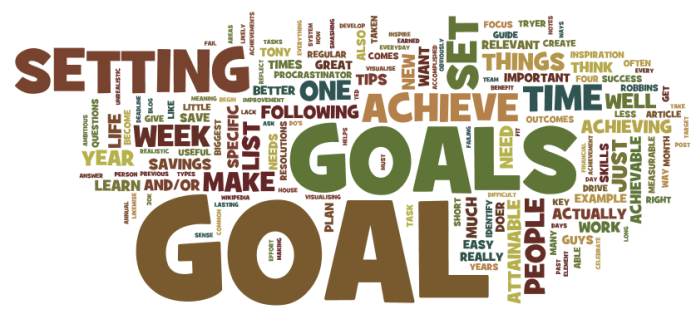According to a recent survey, most Americans have quit on their goals for the New Year as of February 1. This is due to many factors with the most common being a lack of self-discipline, a hectic schedule, and external pressures or distractions. However, 1 out of 7 Americans doubt they’re even capable of the goals they set in the first place.
If you don’t have confidence in yourself, motivation and persistence will be hard to maintain, and soon it’ll feel tempting to abandon your progress. So it’s important to tackle goals with a clear, realistic, actionable plan that you know can be achieved. Whether you want to create smarter study habits, audition for the theater production, run for student government, improve your GPA or score that dream internship, here’s your blueprint for Goal Setting 101.
Focus on a SMART Goal
If the goal you want to pursue is too generic, chances are, you won’t stick with it long-term. The key to success is being specific—and that’s where SMART goals come in. This acronym stands for Specific, Measurable, Attainable, Realistic and Time-Bound. Together, these five elements create a practical, useful framework to orient your goals around, which will ultimately increase the likelihood of reaching them. Here’s an example of how to set a SMART goal:
- Specific: I want to raise my current grade in Sociology from a B to an A.
- Measurable: I will do this by carving out 30 minutes to study each night.
- Attainable: I will prioritize these study sessions before I turn on the TV.
- Realistic: I will increase my score on the next Sociology test by 5 points.
- Time-Bound: I will earn an A as my final grade at the end of this semester.
Jot Your Objective Down
You know that rush of satisfaction from writing a task on your to-do list, then crossing it off after completion? It’s not just your imagination—there’s an actual science to this feeling. Dr. Gail Matthews, a psychology professor at the Dominican University in California found that you are 42 percent more likely to achieve a goal if it’s written down.
That’s because this action forces you to interact with the goal in both a visual and tactile way, to brainstorm strategies, track momentum, and even hold yourself accountable. So whether you jot them in a planner or on a post-it note stuck to your mirror, make it a consistent practice to write down your goals—then refer to this list as often as possible.
Get Clear About the Why
When you pause to think about why this goal even matters in the first place, you’ll have a clear intention to guide your choices and re-fuel your motivation as obstacles arise. Use that “why” as a compass to steer you in the right direction, as well as remind you of the original commitment you’ve made. So if the goal is to earn an A in Sociology this semester, consider why that feels important to you. The following questions can help with your self-examination:
- How will this goal benefit me, both in the short- and long-term?
- What about this goal fills me with excitement and anticipation?
- Which personal core values will I honor if I achieve this goal?
- Why am I passionate about this goal, even on the tough days?
- Who might I become as a result of working towards this goal?
Map It Out in Increments
Endurance is crucial for long-term success, which means that every step forward matters—no matter how small or gradual it seems. To sustain motivation, focus, stamina and energy levels, it’s helpful to tackle your goal in bite-size increments. This makes it easier to identify milestones and map a course to reach them, while minimizing burnout.
It’s much less overwhelming to start off small, then build on your momentum over time, rather than trying to accomplish the whole 10-point strategy all at once. Choose just one or two main priorities you can manage for the week, then throw your time and effort into them. Don’t look past these micro-goals—concentrate on the now, and resist the urge to jump ahead to the next milestone until you achieve what’s right in front of you.
Get Ready to Crush Your Goals this Semester
As a college student, you have a lot of objectives to balance in both the short- and long-term. But whether your goal is to form healthier daily habits or take on a lofty future ambition, it’s important to create a strategic plan, so you can take intentional, decisive action. To that end, these steps for Goal Setting 101 will put you on-track for a successful semester.









